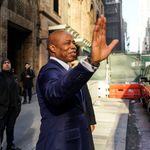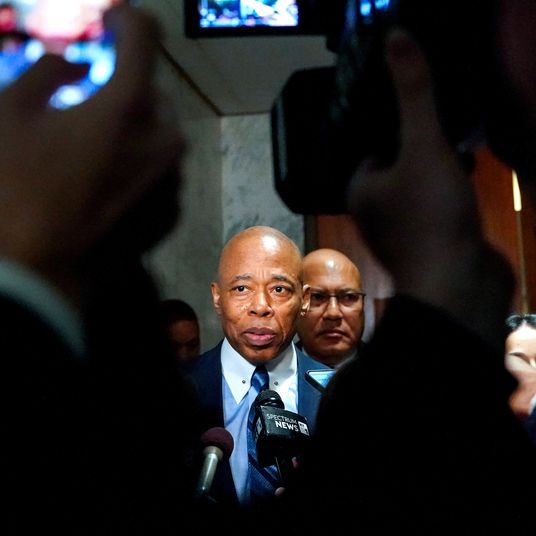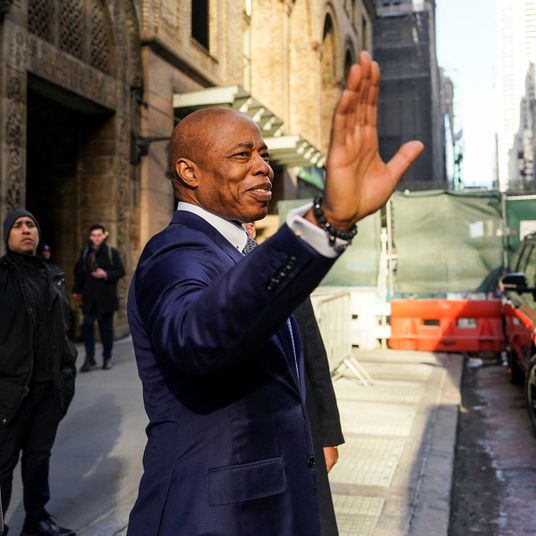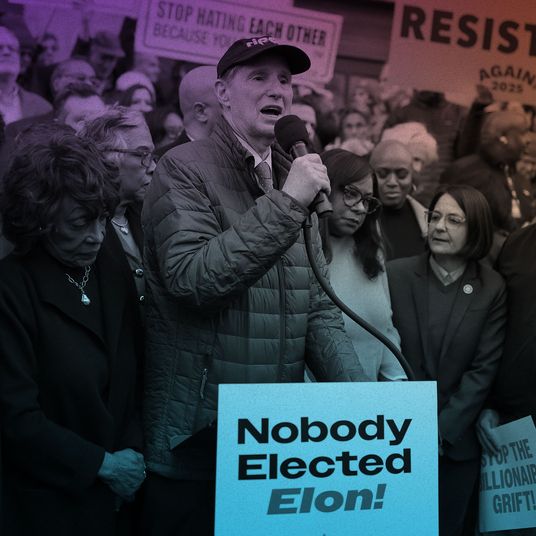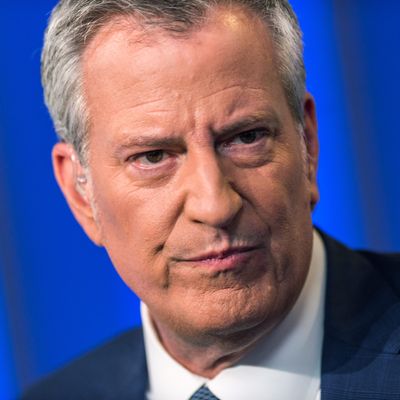
Let’s get this out of the way: Yes, it is very unusual that the two most recent mayors of New York City decided to run for president this year and their campaigns never even overlapped — because Bill de Blasio’s failed quickly, Michael Bloomberg took a year to decide to run, and because our presidential election process lasts longer than an elephant’s gestation period.
So the country never got to see de Blasio and Bloomberg — who have never made much of a secret of their less-than-warm feelings for each other — compete directly. But, de Blasio called New York this week to say that’s not going to stop the current mayor from sharing his opinions. In fact, he would like to make clear that if he can’t be president, it’s his intention to speak out against Bloomberg’s White House ambitions, quite loudly if necessary.
“He’s questionably a Democrat to begin with, at this point in his life. And [he] is going to have to defend a whole series of policies that are absolutely out of step with what today’s Democratic Party is thinking,” said de Blasio, whose early tenure as mayor was in some ways defined by reaction to the Bloomberg years. (We can leave another previous mayor out of this one.)
His predecessor’s political legacy and ambitions are “very personal for me, obviously. And I’m not someone who fails to recognize some good he did here — in fact, in his first term, I think he did a lot of good. But I saw how corroded it got. I saw how aggressively out of touch he got as time went by.” So now, de Blasio said, “I have a particular perspective. I spent six years undoing what he did, and having to fix a lot of things, a lot of which have not been accounted for publicly. And I think it’s important for the truth to come out.”
It’s not new for the progressive de Blasio to criticize the billionaire former Republican and independent (who was also, before that, a Democrat, and who has since been one of the Democrats’ biggest benefactors). De Blasio also has the time to do it since his own campaign flamed out in September, but it’s not like he is setting a massive national following against the newest candidate in the race. But as Bloomberg has stepped up his presidential considerations and then launched his bid, the current mayor has amplified his criticisms, including point-blank telling reporters earlier this month that Bloomberg should not be the party’s nominee.
Speaking with New York, de Blasio reserved his harshest criticism for Bloomberg’s criminal-justice record, casting his recent apology for the stop-and-frisk policing policy he embraced as mayor as a politically motivated ploy rather than a genuine expression of remorse.
“It’s impossible to think of it as anything other than expedient. There were so many points after he left office where it would have been very natural to acknowledge he was wrong. I mean, year after year of crime going down after we got rid of stop-and-frisk. I remember, vividly, editorial boards acknowledging their own error in this area and saying, ‘We were wrong,’ very overtly. There were plenty of people who came forward and grudgingly acknowledged that a very punitive approach to policing had backfired and actually had hurt the relationship between police and community,” de Blasio said. “He could have been much more of a mensch and just said, ‘Okay, the proof has come back, the jury’s back, I was wrong.’ But even more so, when Trump started making a positive mythology of stop-and-frisk, including in the 2016 presidential debates. Trump really put this front and center as a positive policy that should be used more widely, and it would have been a very natural moment for Bloomberg to say, ‘No, I tried it, I was wrong, it didn’t work.’”
Bloomberg hasn’t responded to de Blasio personally, but campaign spokesman Stu Loeser emailed, in response, “As mayor, Mike Bloomberg always said that government should be measured by outputs — results for New Yorkers — instead of just money spent. But even by that measure it’s hard to honestly argue that a mayor who doubled city spending on schools, nearly doubled spending on homeless services, built what was then the largest affordable housing program in the country and increased teacher pay by 44% doesn’t have a solid record to run on.” He then took his own indirect swipe at de Blasio. “Mike Bloomberg also cracked down on pay-to-play by limiting every city official’s ability to raise contributions from people and entities that did business with the government and of course he never took a penny like that himself.”
For his part, de Blasio has long sought a role as a prominent national voice on the left, and his frustration with the considerably more moderate Bloomberg’s bid — and the attention it’s received — is obvious, and a clear reason for his decision to speak up now.
While the former mayor himself seldom talks about his successor at all, some in Bloomberg’s orbit haven’t hesitated to skewer de Blasio, sometimes in personal terms. “This is driving de Blasio crazy,” said Bradley Tusk, a former Bloomberg adviser and campaign manager who is still close with his political circles. “De Blasio is someone who doesn’t like his day job of being mayor, only dreams of being involved in national issues, and his candidacy, like his mayoralty, was a total joke.”
Exactly one week after apologizing for stop-and-frisk at a black Brooklyn megachurch, Bloomberg formally launched his campaign with a video pitching him as the one to “rebuild America.” The tycoon is planning on skipping the first four states in the primary process, but the spot is part of a national push that amounts to the largest one-week television ad buy of any campaign, ever.
In the ad, Bloomberg wades into the health-care debate with an implicit rebuke of Medicare for All policies promoted by candidates including Bernie Sanders and Elizabeth Warren (and, briefly, de Blasio) that move toward eliminating private health-insurance policies. It instead promotes a system “where everyone without health insurance is guaranteed to get it, and everyone who likes theirs can go ahead and keep it.”
Here, too, de Blasio objected. While he pointed that out he supported some of Bloomberg’s public-health initiatives like smoking bans and soda size limits, he said he was “dubious of moderates who come bearing gifts” on health-care reform. (While running for president, de Blasio portrayed himself as a provider of universal health coverage to New Yorkers, though he did not implement a full single-payer program or universal health insurance.)
Of the language in the ad, de Blasio said, “It’s hard to place it with him, because he never spoke to these issues in a meaningful way previously. It’s important, for someone who’s been around for as long as he has, to look at his actions and not take his words too seriously. He has been a free-marketeer his entire life, and always favors market solutions when it comes to anything economic.” De Blasio continued, “And the notion that suddenly he wants to make sure everyone has health insurance? I never saw him advocate coherently for universal health care, so it’s hard to believe he’s suddenly a convert.”
After touching on health care, the Bloomberg ad shows the outside of Trump Tower and promises “the wealthy will pay more in taxes and the struggling middle class will get their fair share.”
Taxing the wealthy “doesn’t fit anything we’ve ever seen from him before, and this is where you can’t just buy your way out of your contradictions,” said de Blasio of Bloomberg, a longtime ally of Wall Street who did increase property taxes in 2003, after the post-9/11 budget crisis. “Here’s a guy who, after the Great Recession, had no coherent response to the greatest economic crisis of our times. He opposed an increase in wages, he opposed paid sick days for working people, did not want to tax the wealthy more, explicitly. And was very sympathetic to the financial industry, even though they were the cause of the Great Recession.”
“I think people are smarter than Bloomberg gives them credit for,” de Blasio added. “I think they will see these contradictions pretty quickly.”





